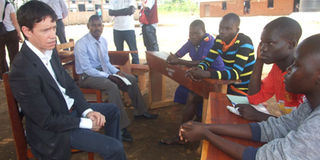UK pledges more aid to refugees in Uganda

Meeting. Mr Rory Stewart, the UK minister of State for International Development (left) interacts with South Sudanese pupils at Vurra Cope Primary School in Oriama Sub-county, Arua District last week. PHOTO BY CLEMENT ALUMA
What you need to know:
Ranked. Uganda is currently ranked as the second-largest refugee-hosting country in the world after Turkey.
ARUA. United Kingdom minister of State for International Development Rory Stewart has said his government will increase its assistance to help Uganda cope with the burgeoning refugee population in the country.
The increased funding, he said, will support educational programmes for the 1.3 million refugees in Uganda, majority being South Sudanese.
“The immediate challenge is in education and my government has been working with the Office of the First Lady (Janet Museveni), who is the Minister of Education, and the relationship between our governments has been good. We are looking to give direct assistance to Uganda apart from what we do [through] the United Nations Refugee Agency,” Mr Stewart said.
Last week’s revelation of planned higher British government support comes six months after Ms Museveni in January discussed prospective UK-Uganda partnerships with senior officials of the Foreign and Commonwealth and Department for International Development (DFID) in London.
The UK government, according to official figures, spends about $125m (about Shs450b) per year through its bilateral programme in Uganda to, among other things, provide humanitarian assistance, improve the quality of essential services and protect the most vulnerable.
In an interview with this newspaper last Friday, Mr Stewart who was visiting Vurra Cope Primary School in Oriama Sub-county, Arua District, said he would make recommendations on the planned level of assistance based on his field findings. The school he visited is overwhelmed with an enrolment of 2,185 pupils, majority being South Sudanese children.
During his visit to Uganda in February, Mr James Wharton, the UK minister for International Development, acknowledged that Uganda is burdened by the continuing refugees influx and “so the international community must now step up alongside the UK to help encourage the longer-term stability of South Sudan, Uganda and the broader region.”
In his remarks in Arua last week, Mr Stewart urged regional powers to do more to end the war in South Sudan triggered in 2013 by political fallout between president Salva Kiir and his former vice president Riek Machar.
The UN Secretary General Antonio Guterres, who visited Uganda last month to co-host the International Solidarity Conference to raise a targeted $2b for refugees, warned that time is up for the warring factions to resolve their differences or else regional countries attempting a peace process move in to forge a political solution.
An internationally-supported truce pact negotiated under the aegis of the Inter-Governmental Authority on Development suffered a still-birth after the warring parties ignored it.
Mr Cosmas Richard Mabe, a South Sudanese refugee, who teaches at Vurra Cope Primary School, told minister Stewart last week that: “We are very grateful to the host communities here because they have welcomed us very well; they gave us a place where to build and even give us food when we don’t have.”
Some of the pupils and teachers appealed for a lunch of at least porridge to be provided to them to prevent children from dropping out of school due to hunger.
The UK official praised Uganda’s liberal refugee policy and legendary hospitality, describing it as “unique”.
KEY issues
Recommendations. In an interview with this newspaper last Friday, Mr Stewart who was visiting Vurra Cope Primary School in Oriama Sub-county, Arua District, said he would make recommendations on the planned level of assistance based on his field findings.
Warned. The UN Secretary General Antonio Guterres, who visited Uganda last month to co-host the International Solidarity Conference to raise a targeted $2b for refugees, warned that time is up for the warring factions to resolve their differences or else regional countries attempting a peace process move in to forge a political solution.
Funding. The increased funding, he said, will support educational programmes for the 1.3 million refugees in Uganda, majority being South Sudanese.




